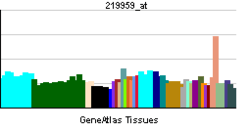MOCOS
| Molybdenum cofactor sulfurase | |||||||||||||
|---|---|---|---|---|---|---|---|---|---|---|---|---|---|
| Identifiers | |||||||||||||
| Symbols | MOCOS ; HMCS; MCS; MOS | ||||||||||||
| External IDs | OMIM: 613274 MGI: 1915841 HomoloGene: 9931 GeneCards: MOCOS Gene | ||||||||||||
| EC number | 2.8.1.9 | ||||||||||||
| |||||||||||||
| RNA expression pattern | |||||||||||||
 | |||||||||||||
| More reference expression data | |||||||||||||
| Orthologs | |||||||||||||
| Species | Human | Mouse | |||||||||||
| Entrez | 55034 | 68591 | |||||||||||
| Ensembl | ENSG00000075643 | ENSMUSG00000039616 | |||||||||||
| UniProt | Q96EN8 | Q14CH1 | |||||||||||
| RefSeq (mRNA) | NM_017947 | NM_026779 | |||||||||||
| RefSeq (protein) | NP_060417 | NP_081055 | |||||||||||
| Location (UCSC) | Chr 18: 33.77 – 33.85 Mb | Chr 18: 24.65 – 24.7 Mb | |||||||||||
| PubMed search | |||||||||||||
Molybdenum cofactor sulfurase is an enzyme that in humans is encoded by the MOCOS gene.[1][2]
MOCOS sulfurates the molybdenum cofactor of xanthine dehydrogenase (XDH) and aldehyde oxidase (AOX1), which is required for their enzymatic activities.[1]
References
- ↑ 1.0 1.1 Ichida K, Matsumura T, Sakuma R, Hosoya T, Nishino T (Apr 2001). "Mutation of human molybdenum cofactor sulfurase gene is responsible for classical xanthinuria type II". Biochem Biophys Res Commun 282 (5): 1194–200. doi:10.1006/bbrc.2001.4719. PMID 11302742.
- ↑ "Entrez Gene: MOCOS molybdenum cofactor sulfurase".
Further reading
- Maruyama K, Sugano S (1994). "Oligo-capping: a simple method to replace the cap structure of eukaryotic mRNAs with oligoribonucleotides.". Gene 138 (1–2): 171–4. doi:10.1016/0378-1119(94)90802-8. PMID 8125298.
- Suzuki Y, Yoshitomo-Nakagawa K, Maruyama K et al. (1997). "Construction and characterization of a full length-enriched and a 5'-end-enriched cDNA library". Gene 200 (1–2): 149–56. doi:10.1016/S0378-1119(97)00411-3. PMID 9373149.
- Strausberg RL, Feingold EA, Grouse LH et al. (2003). "Generation and initial analysis of more than 15,000 full-length human and mouse cDNA sequences". Proc. Natl. Acad. Sci. U.S.A. 99 (26): 16899–903. doi:10.1073/pnas.242603899. PMC 139241. PMID 12477932.
- Yamamoto T, Moriwaki Y, Takahashi S et al. (2003). "Identification of a new point mutation in the human molybdenum cofactor sulferase gene that is responsible for xanthinuria type II". Metab. Clin. Exp. 52 (11): 1501–4. doi:10.1016/s0026-0495(03)00272-5. PMID 14624414.
- Beausoleil SA, Jedrychowski M, Schwartz D et al. (2004). "Large-scale characterization of HeLa cell nuclear phosphoproteins". Proc. Natl. Acad. Sci. U.S.A. 101 (33): 12130–5. doi:10.1073/pnas.0404720101. PMC 514446. PMID 15302935.
- Gerhard DS, Wagner L, Feingold EA et al. (2004). "The status, quality, and expansion of the NIH full-length cDNA project: the Mammalian Gene Collection (MGC)". Genome Res. 14 (10B): 2121–7. doi:10.1101/gr.2596504. PMC 528928. PMID 15489334.
- Beausoleil SA, Villén J, Gerber SA et al. (2006). "A probability-based approach for high-throughput protein phosphorylation analysis and site localization". Nat. Biotechnol. 24 (10): 1285–92. doi:10.1038/nbt1240. PMID 16964243.
- Peretz H, Naamati MS, Levartovsky D et al. (2007). "Identification and characterization of the first mutation (Arg776Cys) in the C-terminal domain of the Human Molybdenum Cofactor Sulfurase (HMCS) associated with type II classical xanthinuria". Mol. Genet. Metab. 91 (1): 23–9. doi:10.1016/j.ymgme.2007.02.005. PMID 17368066.